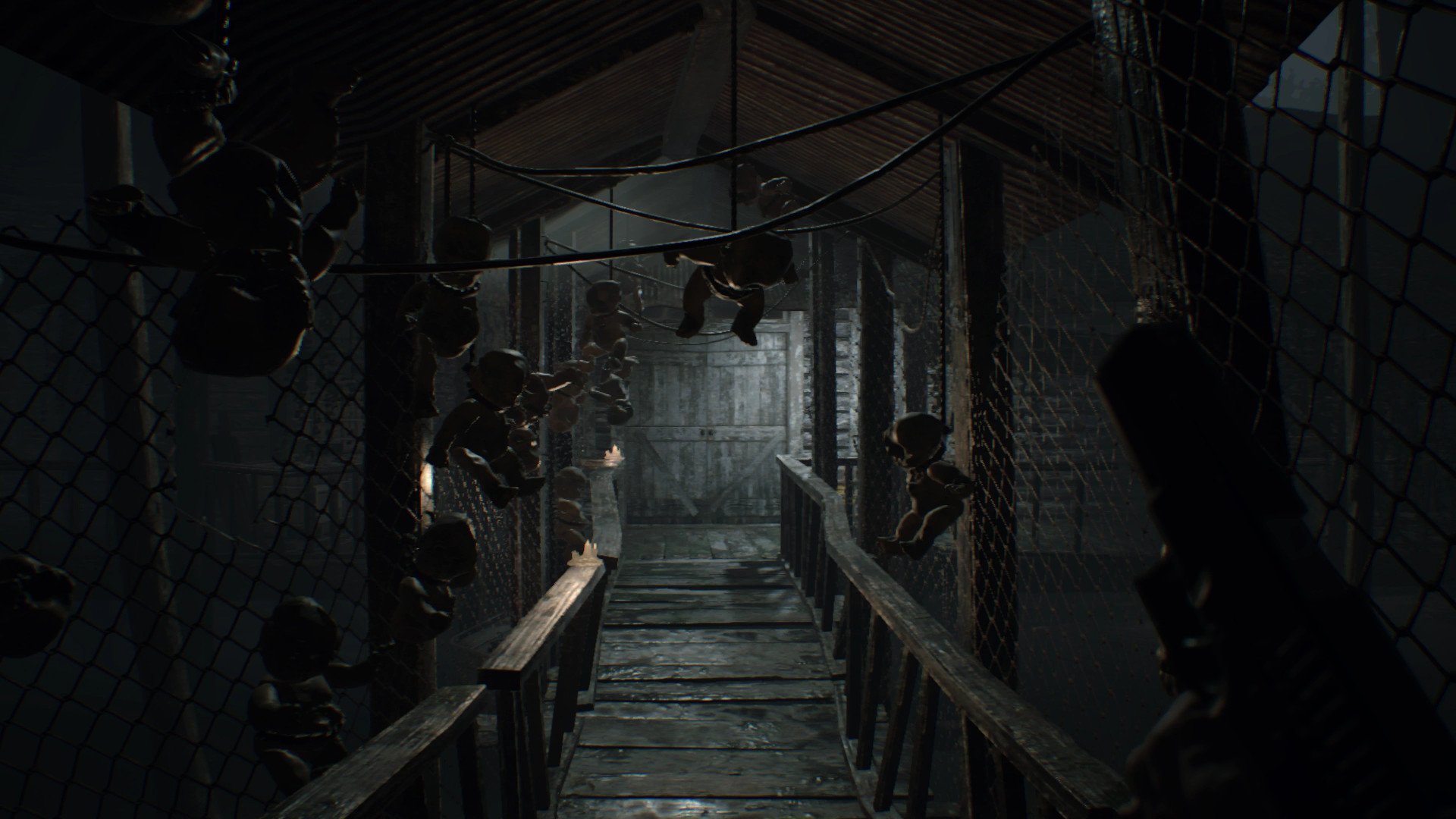
I'm a huge fan of the Resident Evil series. I used to pen fan fiction of the game as a child, and receiving the demo disc for Resident Evil 2 is one of my earliest memories of video game hype-driven joy. It's that nostalgia that inspired my disappointment with Resident Evil 5 and 6, both of which took a hard swing to third-person action. Resident Evil spent a long time putting the classic series' tense, survival-driven horror gameplay on the back seat in attempts to appeal to a wider audience.
Following the success of the re-release of the Resident Evil HD re-master, it appears Capcom has finally accepted that they can't turn Resident Evil into an action series. Enter Resident Evil 7: Biohazard.
Warning: This review contains a few violent game images.
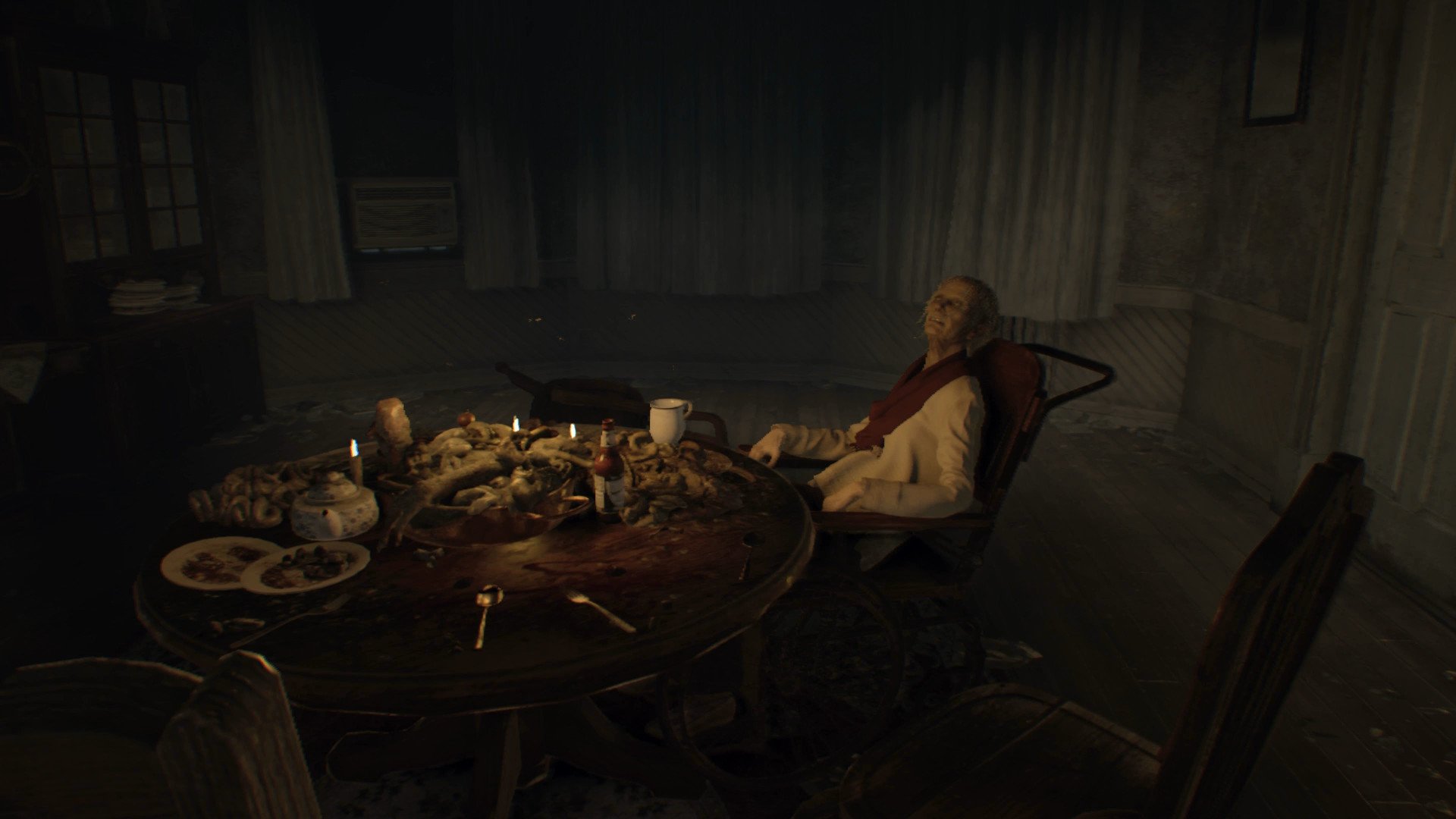
In Brief
Resident Evil 7: Biohazard is tremendous. While it has a couple of technical issues on Xbox One, with quirky texture popping and some minor frame rate drops, RE7 delivers big on that Resident Evil promise. This is a pure horror game. It utilizes modern technology to fully realize those horrific, gruesome designs of its ancient predecessors, breathing fresh life into the previously decaying series.
Key hunting is back, ammo is scarce, combat is punishing, as well as context-sensitive and visceral, and the game's atmosphere is relentlessly immersive. Capcom has made a major step in the right direction when it comes to bringing Resident Evil back from the dead. Resident Evil 7 is a must-buy purchase for both fans of the series and of horror games in general. And hey, it's an Xbox Play Anywhere cross-buy, cross-save title for Xbox One and the Windows 10 Store. See below for our full, spoiler-free, gore-spattered review.
- Buy Resident Evil 7: Biohazard on Xbox and Windows 10
- Buy Resident Evil 7: Deluxe Edition on Xbox and Windows 10
Cinematic Evil
Visuals, Setting & Atmosphere
Resident Evil 7: Biohazard is built using all-new Capcom tech, dubbed the Resident Evil Engine. Presumably, it is this engine that Capcom will use to develop Resident Evil titles moving forward, including the planned remake of Resident Evil 2. And thankfully, this bodes well for the future of the franchise.
All the latest news, reviews, and guides for Windows and Xbox diehards.
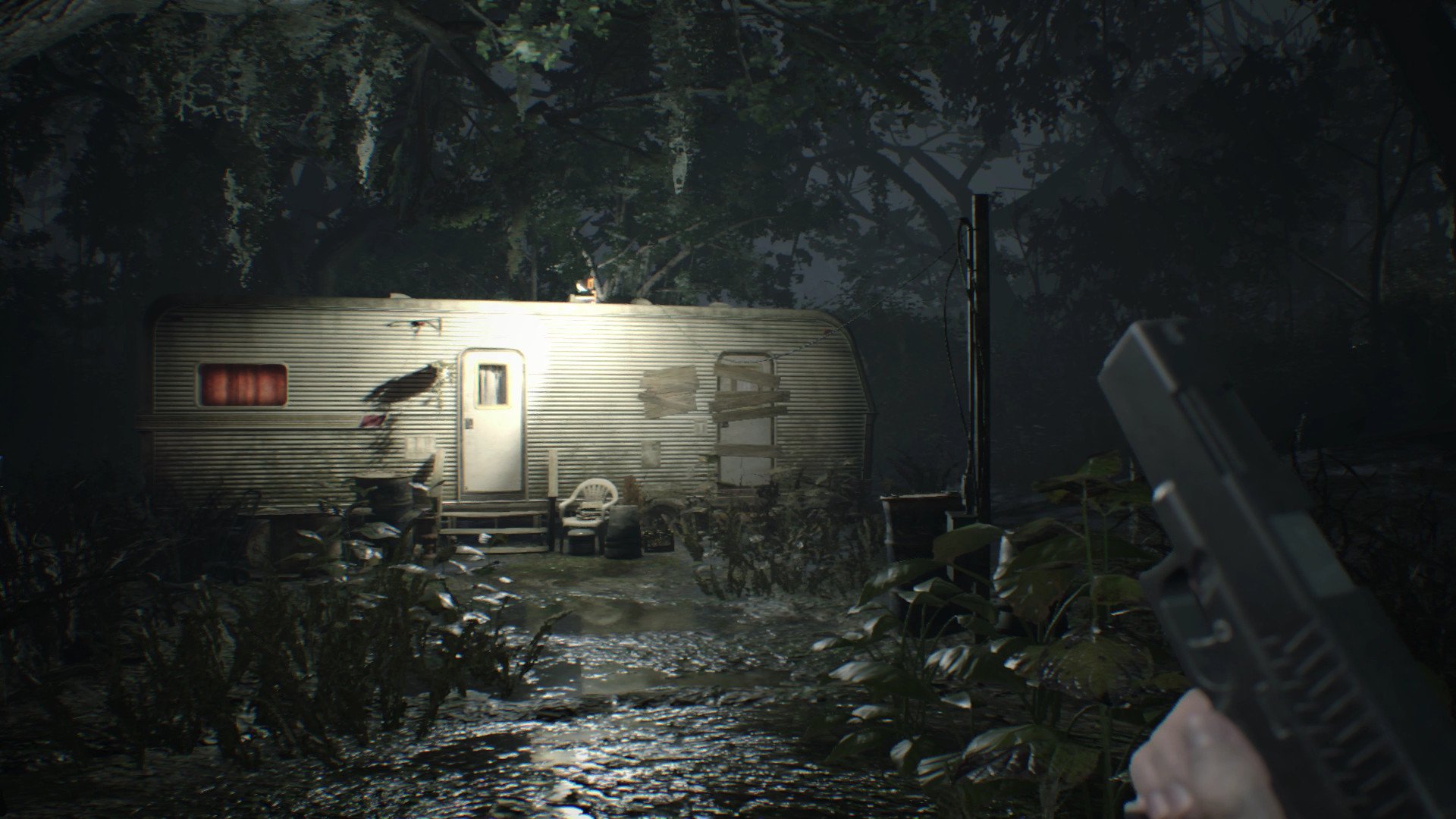
RE7 uses dynamic scaling on Xbox One, targeting a 1080p resolution. There are some issues with frame rate drops and slow texture popping, but for the most part, the engine weaves some of the franchise's most detailed environments to date. It's almost as if those detailed, but pre-rendered concepts of Resident Evil 1 through 3 have been properly realized in true 3D. In that sense, Resident Evil 7 feels more like a true successor to the original trilogy than any of the other games in between.
The game's moody lighting and surprisingly effective use of depth of field give RE7 cinematic qualities few games can match.
It might seem like an odd statement to make, given the game's shift from third-person views into first-person. Indeed, RE7 places your view directly behind the eyes of the game's new protagonist, Ethan, as he struggles through a Louisiana plantation full of twisted horrors. Ethan is hunting for his wife, Mia, who has been missing for three years. Upon receipt of a mysterious videotape, Ethan arrives alone to a hidden ranch deep in a Louisiana bayou. From the outside, it looks wholly abandoned. However, it's not long before Ethan realizes something is terribly terribly wrong.
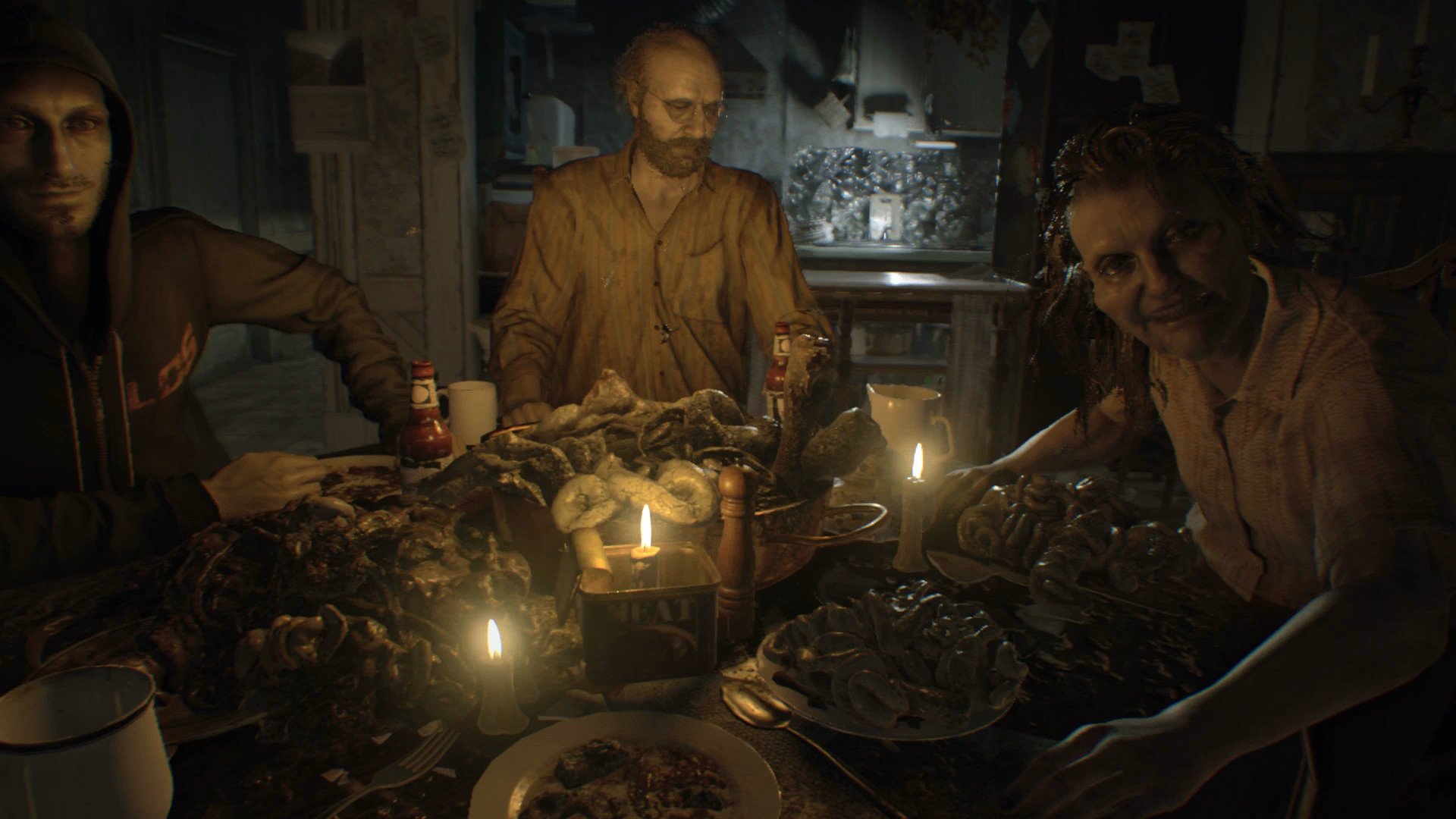
Without giving too much away, Resident Evil 7 represents a cinematic step up for the series. Delivering some quality voice work, relatable, memorable characters and utterly horrific enemies, Resident Evil 7 doesn't shy away from its adults-only rating. It delivers something a little more mature than its near-comic book escapades of previous titles.
I don't want to spoil all the surprises, but I'm confident that Resident Evil 7's Baker family will be remembered among the series' most shocking antagonists. These are villains and situations that could have been plucked right out of a quality 80s slasher flick, with all the high-intensity violence and coarse language to go with it. Don't expect any awkward "Jill sandwich" lines in this game (although there are a few cheeky references).
The game's moody lighting and surprisingly effective use of depth of field give RE7 cinematic qualities few games can match. Those dynamic shadows can alert you to a creeping enemy's presence, but Capcom also deploys them to make you fearful and paranoid of any harmless movement. When it comes to the depth of field blurring, I suppose it came about as a result of RE7 being designed from the ground up for VR, but it translates extremely well into the first-person format for Xbox One and Windows 10. It gives the game a subtle, but visceral quality when wielding weapons, which become blurred while withdrawn in the foreground.
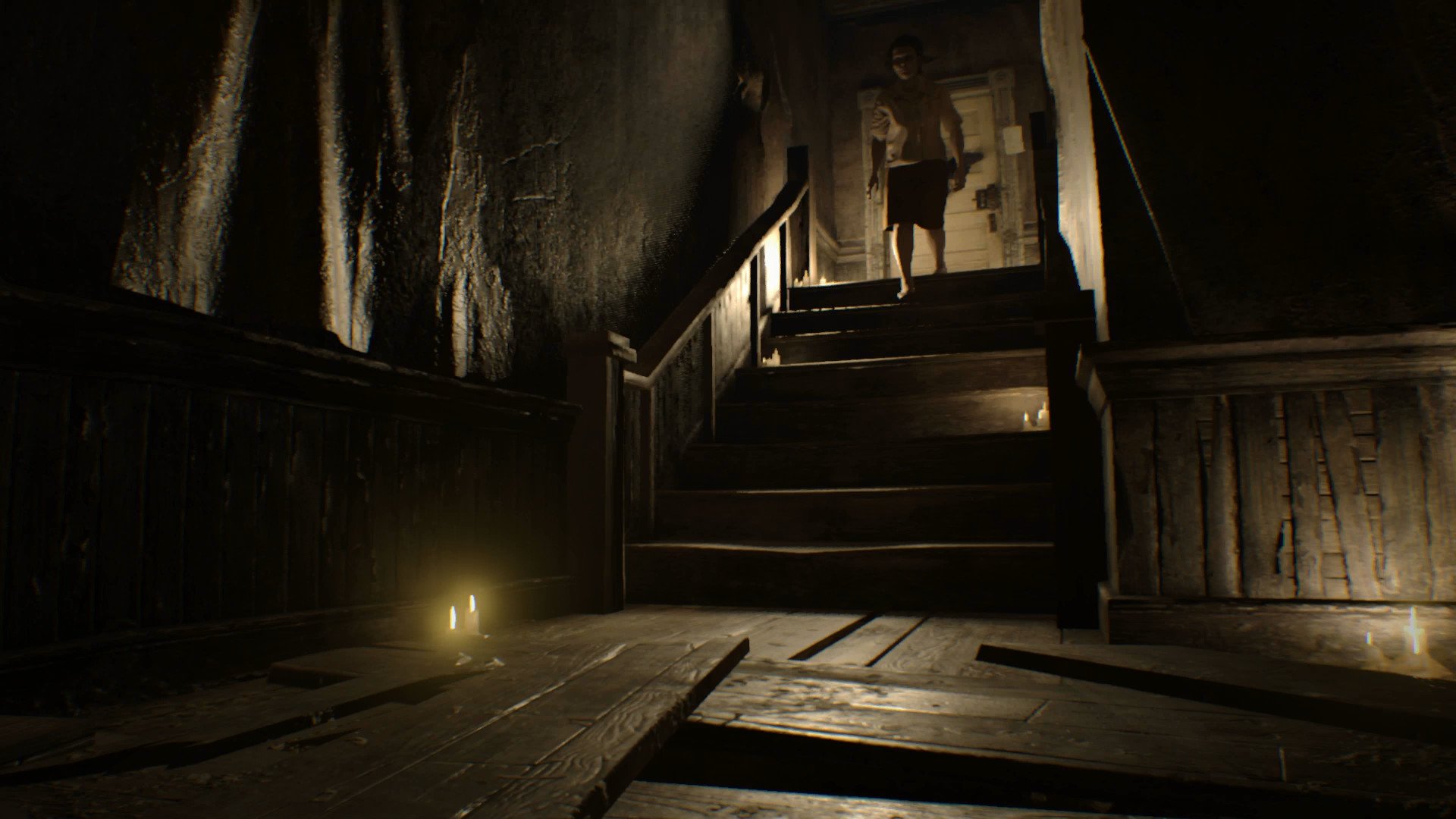
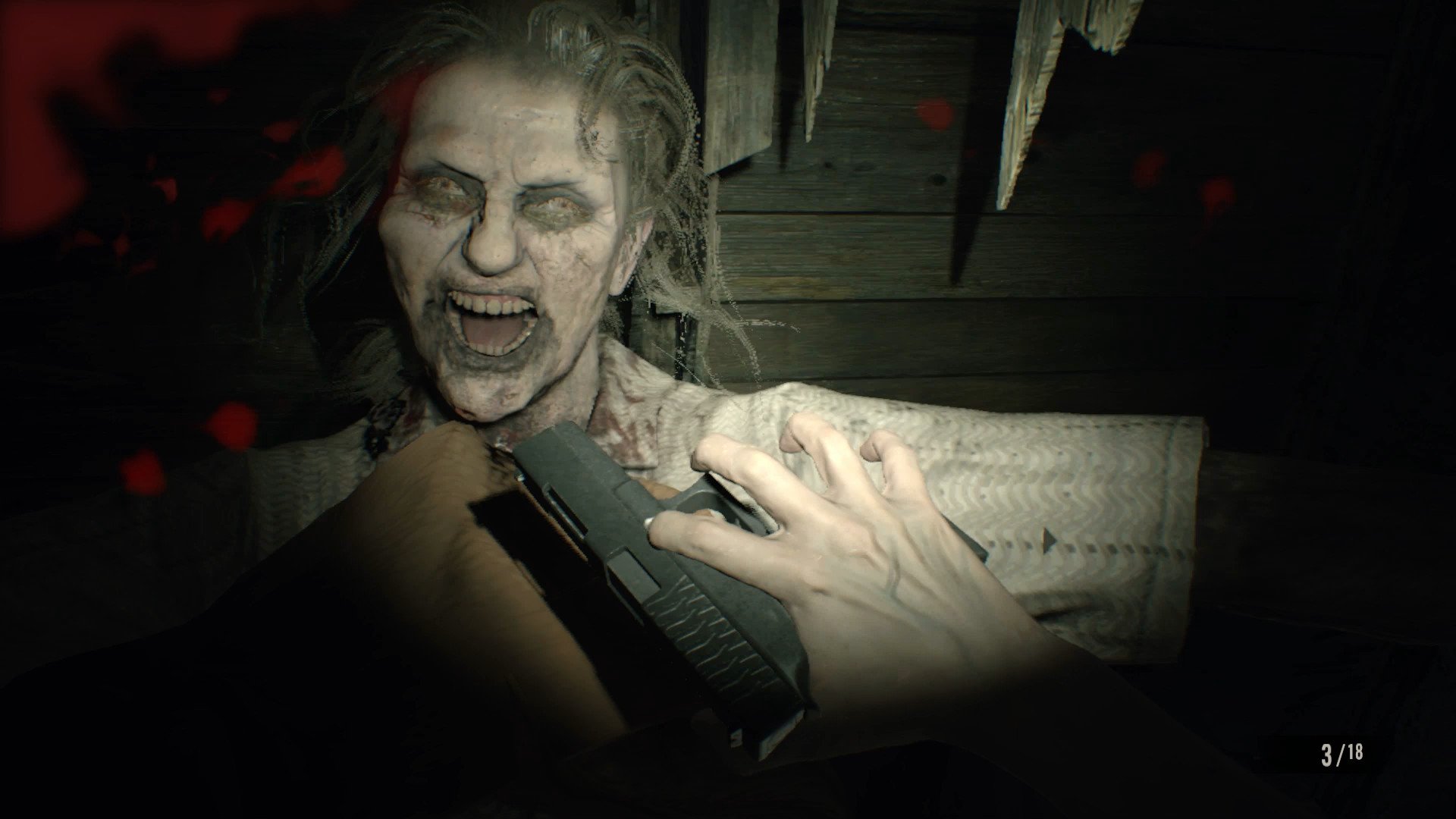
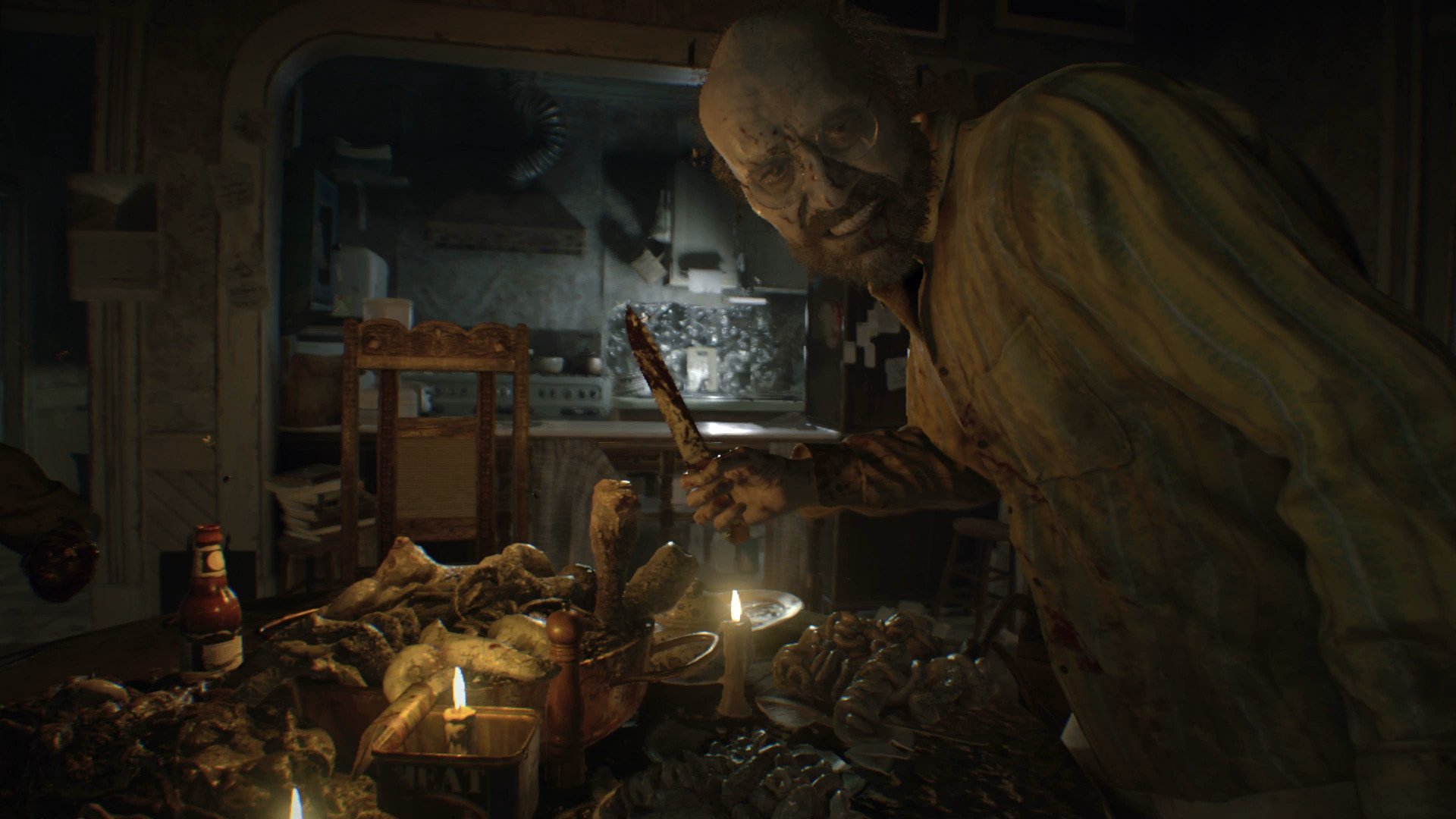
Enemies, on the other hand, always appear sharp in Ethan's view, lunging with incredible texture work and animations. The RE Engine has some verifiably insane flesh-stripping technology, which allows you to leave gaping wounds on enemies dynamically. In some boss fights, you'll strip enemy's faces down to their twitching skulls, plastering them with bullet holes. It gives combat an incredible sense of impact and immersion, feeling as though you're participating in a live action movie rather than wielding a gameplay mechanic. Guns smolder after every shot, and enemies get covered not only in their own blood, but your blood, after landing bites and other attacks. I cannot praise Resident Evil 7's attention to detail enough.
It's simply hard to tell sometimes whether those noisy footsteps off to the left are a real enemy, or just the game screwing with you. It can be terrifying.
Initially, I noted that Resident Evil 7 suffers from a lack of music. RE7 makes heavy use of environmental ambiance to make you paranoid, utilizing virtual surround sound to issue footsteps and other cues that put you on edge. However, it was the foreboding musical score of old-school Resident Evil games that really amped the fear factor for me as a youngster.
Resident Evil 7 is far more subtle with its musical treatment. In previous Resident Evil games, it was areas without music that hinted at an imminent jump scare. In RE7, subtle chords begin to creep in during some of the game's most harrowing sequences, and given the shift to full 3D areas, you know that the enemy could leap out from literally anywhere, at any time. It's simply hard to tell sometimes whether those noisy footsteps off to the left are a real enemy, or just the game screwing with you. It can be terrifying.
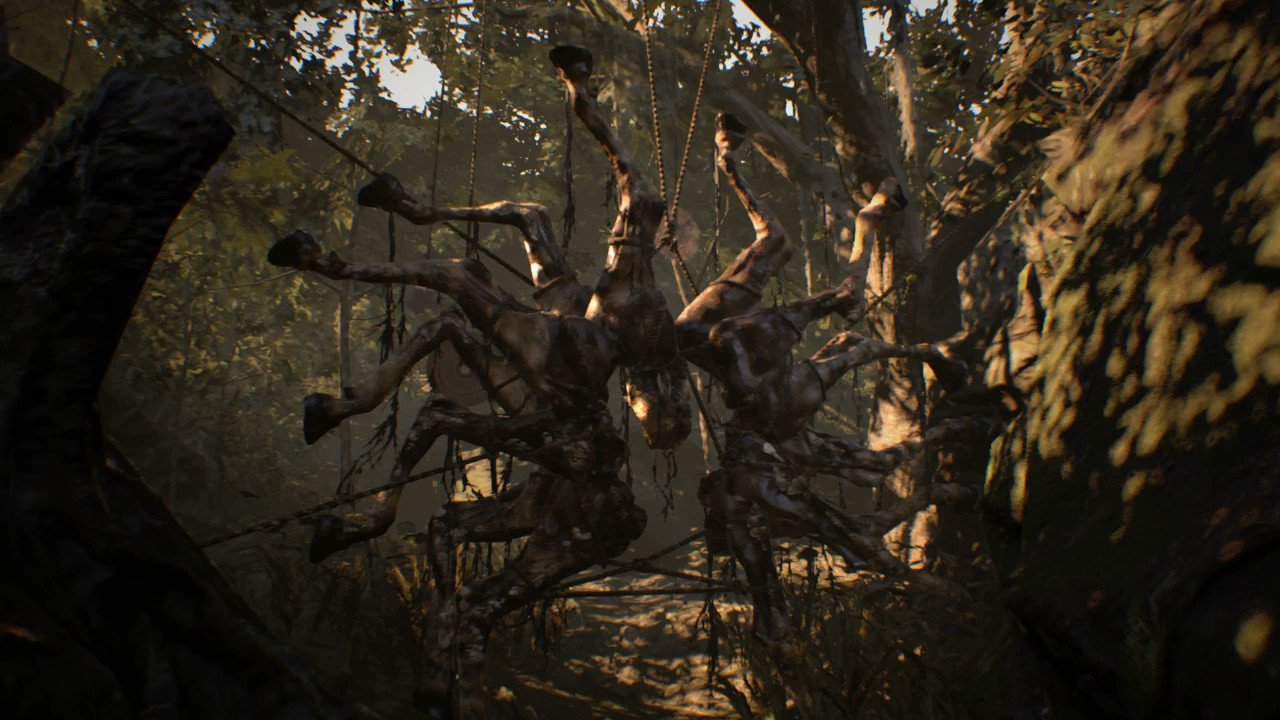
Resident Evil 7's setting is triumphant both in terms of its art and engine. The gore technology, the moody, dynamic lighting, and meticulously realized locations make RE7 as beautiful as it is brutal, with a plot that is intriguing enough to drive you forward.
Beautiful brutality
Gameplay
I think you would be forgiven for having the wrong idea about Resident Evil 7's gameplay if you picked up its "First Hour" demo. The playable teaser clearly riffs on that of the canceled Silent Hills prototype, with complex puzzles and frequent jump scares. However, the full game has far more in common with the classic Resident Evil games 1 through 3, complete with exploration, key hunting gameplay, ammo scavenging, and desperate combat.
Unlike RE4, 5, and 6, ammunition doesn't spawn procedurally from enemies based on your needs. Instead, you have to scavenge in the environment, and Capcom has really outdone themselves when it comes to their hidden items gameplay. Ammo, herbs and crafting items are hidden everywhere. Sometimes behind piles of movable objects, underneath cabinets, and often inside them too. Playing on normal difficulty, you will have to be diligent when it comes to finding resources, as RE7 has some of the most resilient enemies in the series.
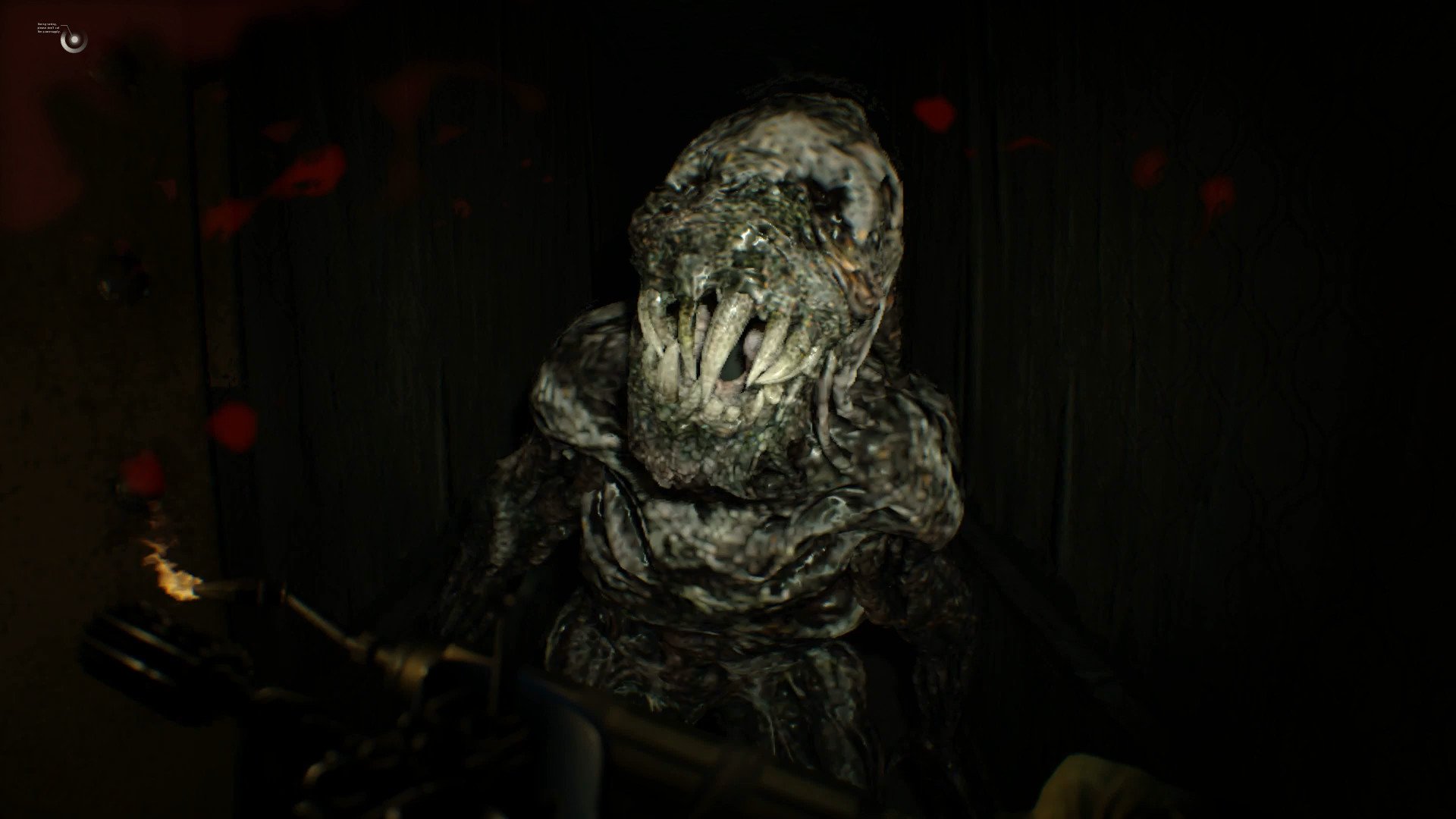
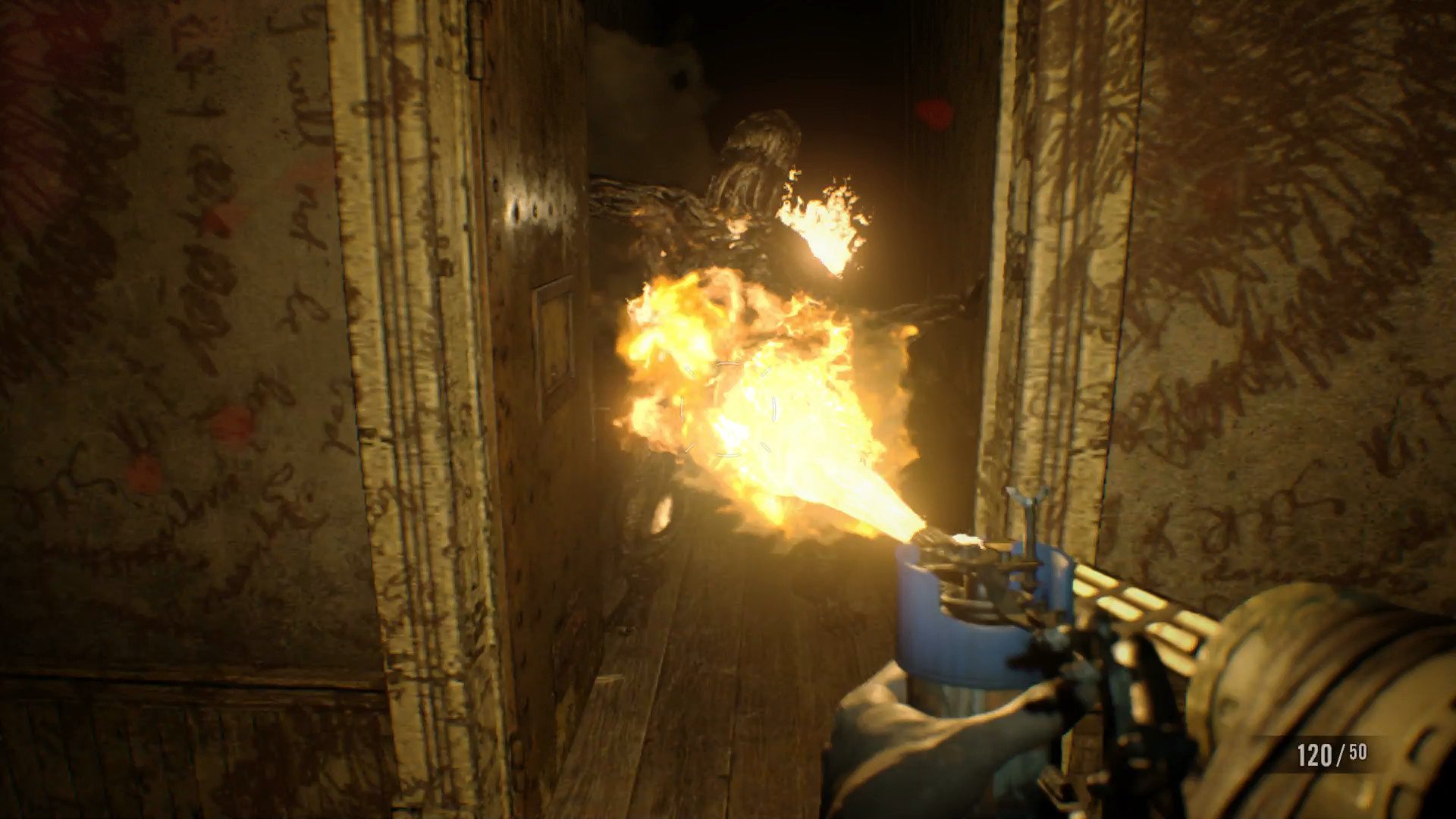
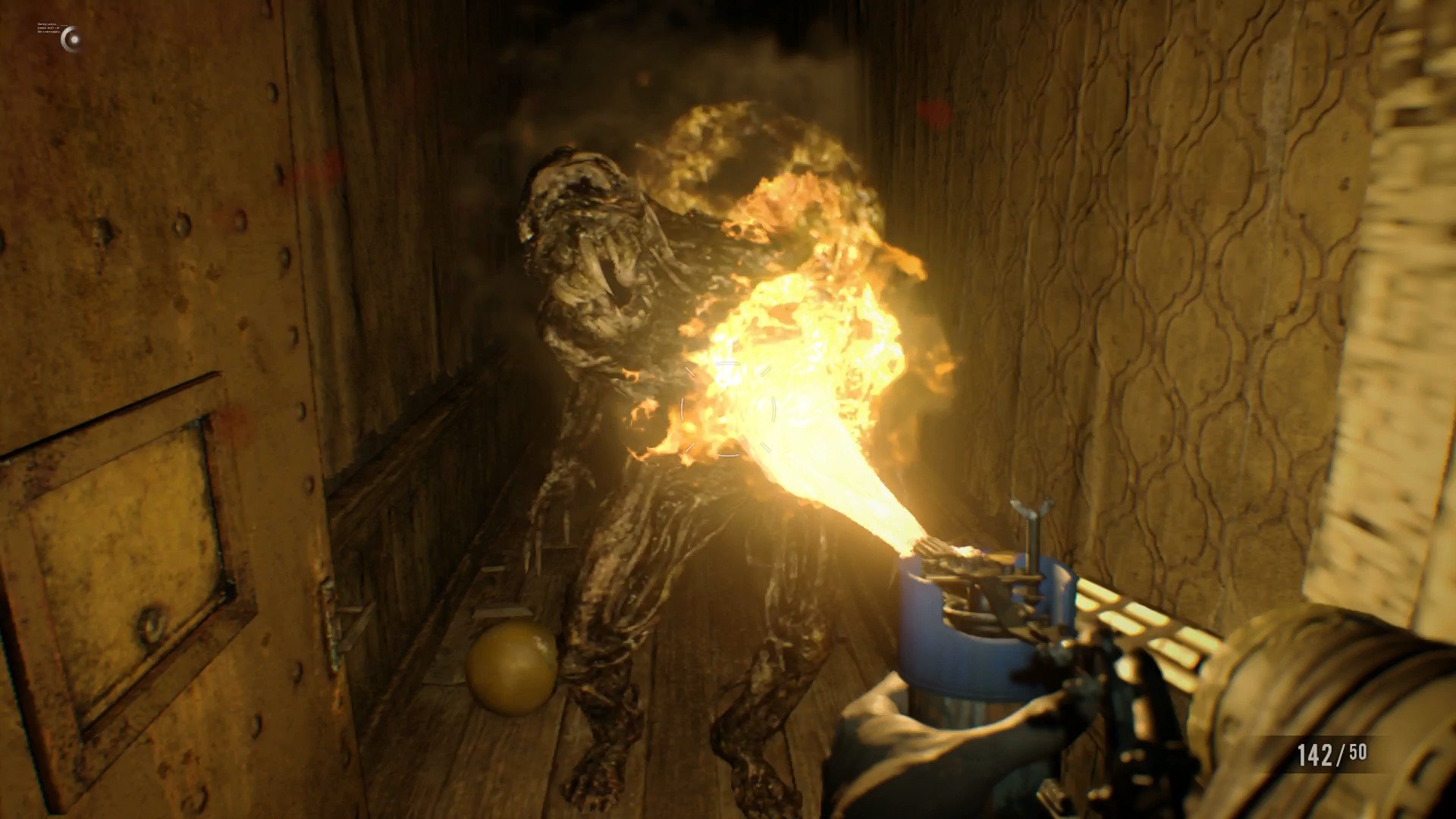
Without giving too much away, some enemies in RE7 will hunt you Nemesis-style through doors, even through walls, smashing through the weak, decrepit structures of the game's locations. Sometimes it's smarter to flee and hide, as rudimentary stealth mechanics allow you to crouch behind objects and avoid certain enemies' fields of view. Sometimes, it's absolutely crucial.
Combat in RE7 is punishing, forcing you to place your shots carefully. Inefficient use of your ammo will result in you becoming helpless, reduced to fumbling with a pocket knife. Every shred of combat is an exciting, paranoia-inducing experience, and more than once, I have found myself beaten down to my last first aid kit, haphazardly slashing bosses with my knife.
The game is light on tutorials, instead offering occasional tips on the loading screen or prompts on the HUD. For the most part, RE7 is intuitive enough not to need tutorials. It leaves you to your own devices as much as possible, reluctant to pull you out of the game's core experience.
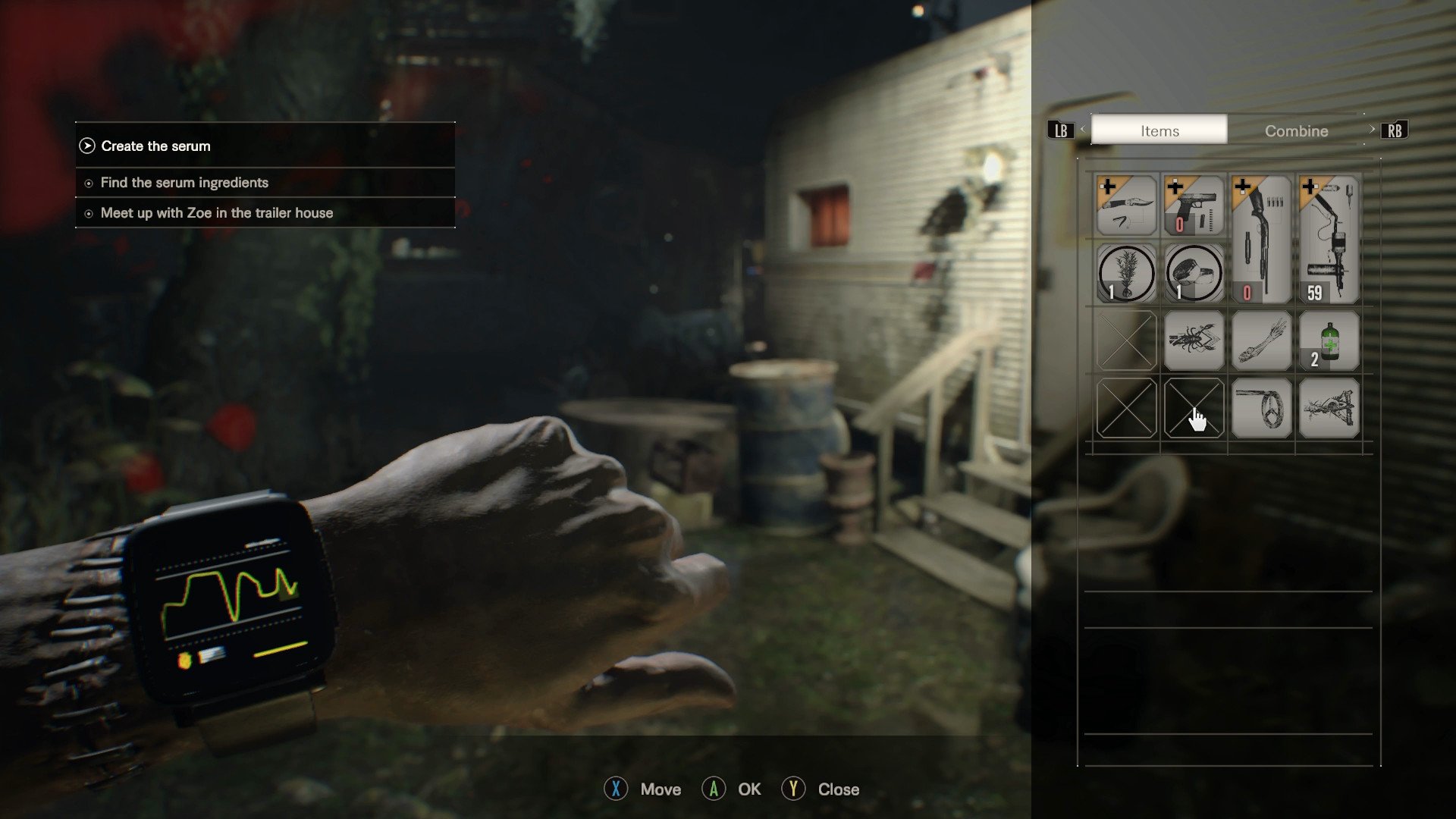
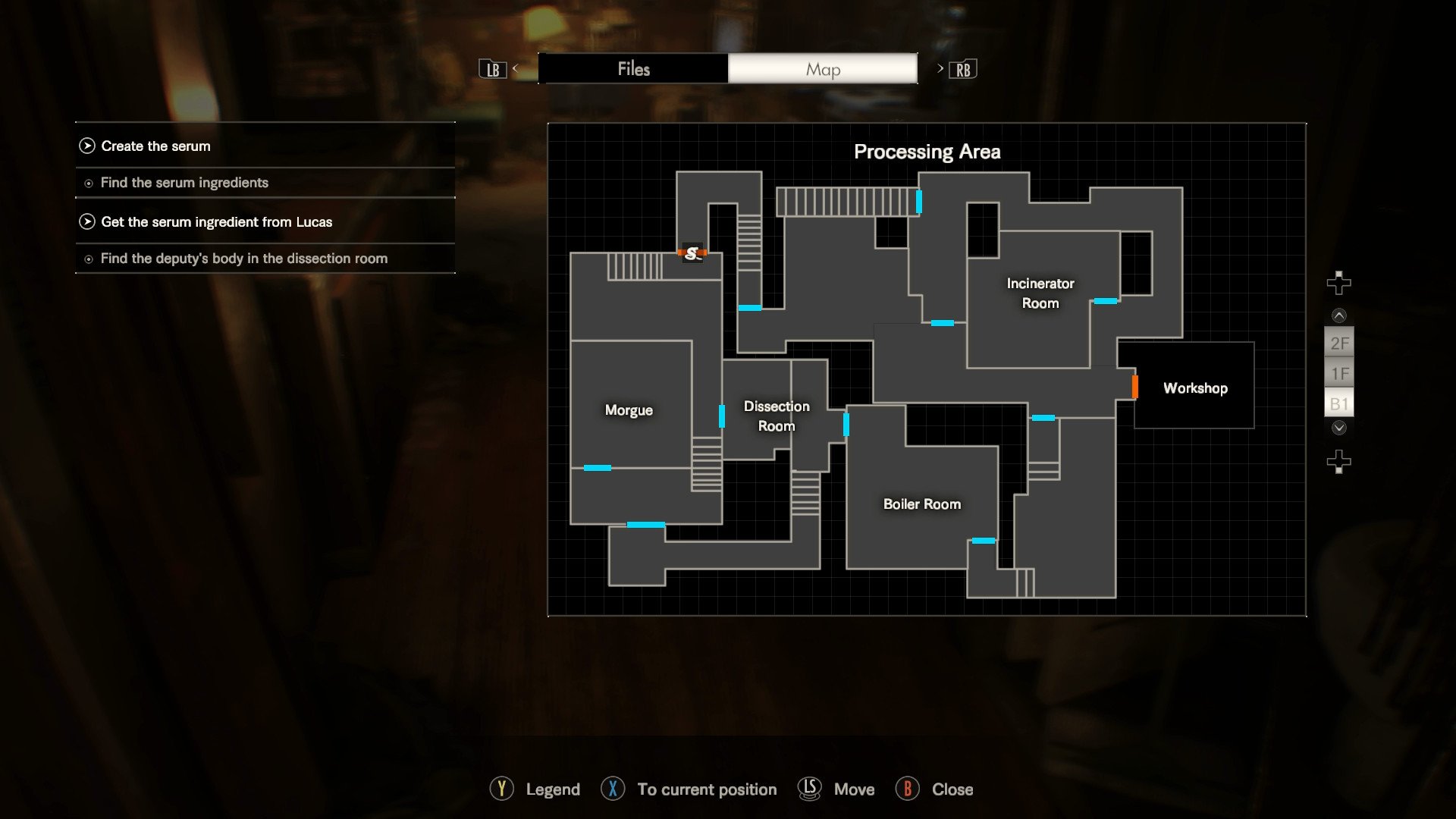
You can block with your hands using the left bumper, which will reduce incoming melee damage when timed correctly. Even when you block, though, the damage will leave huge scars, burns, bites, and various other injuries on your forearms. RE7 takes place in the existing mythology, where advanced pharmaceutical technologies are commonplace. Healing items are quickly deployed using the right bumper, as entering the inventory menu doesn't pause the game as seen with previous games.
RE7's item hunt gameplay extends to weapons, with many appearing to be an optional reward for the overly curious and explorative. Throughout my playthrough, I discovered handguns, a classic shotgun (unlocked in a very classic way), and even a makeshift flamethrower. There are also event-specific weapons. One boss fight gave me use of a chainsaw, providing spectacular (and bloody) results.
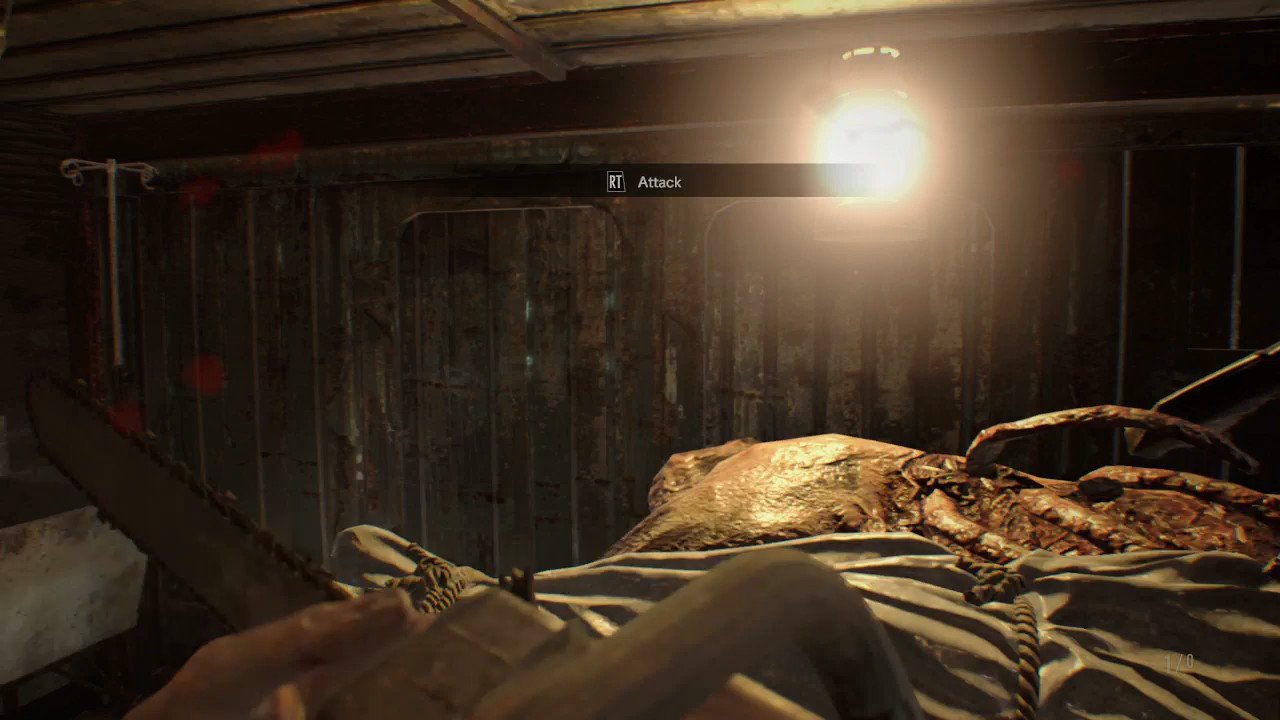
Like classic Resident Evil games, RE7 tasks the player to hunt themed keys that grant access to new areas. While it's not as overly complex as RE1 or 2, RE7 still offers a wealth of locations and traversal opportunities. Unlocking the shotgun, in particular, forces you to backtrack to a previous location, facing off against any leftover enemies on the way.
Additionally, there isn't a weapons and ammo vendor as seen in Resident Evil 4, but there are some rudimentary mechanics that reward you with special items in exchange for scavenging certain collectibles.
That sense of explorative risk vs. reward returns in a big way in RE7, and I can only hope it's here to stay for RE8, 9, and beyond.
These mechanics don't feel far removed from the story itself, thankfully, and they still force you to hunt, risking life and limb. That sense of explorative risk vs. reward returns in a big way in RE7, and I can only hope it's here to stay for RE8, 9, and beyond.
As mentioned above, RE7's intriguing story drives you forward, introducing you to various members of the twisted Baker family as you attempt to find out exactly what happened to your wife, Mia. Capcom presents each new monstrosity in similar fashion to those classic games, with shocking set-pieces.
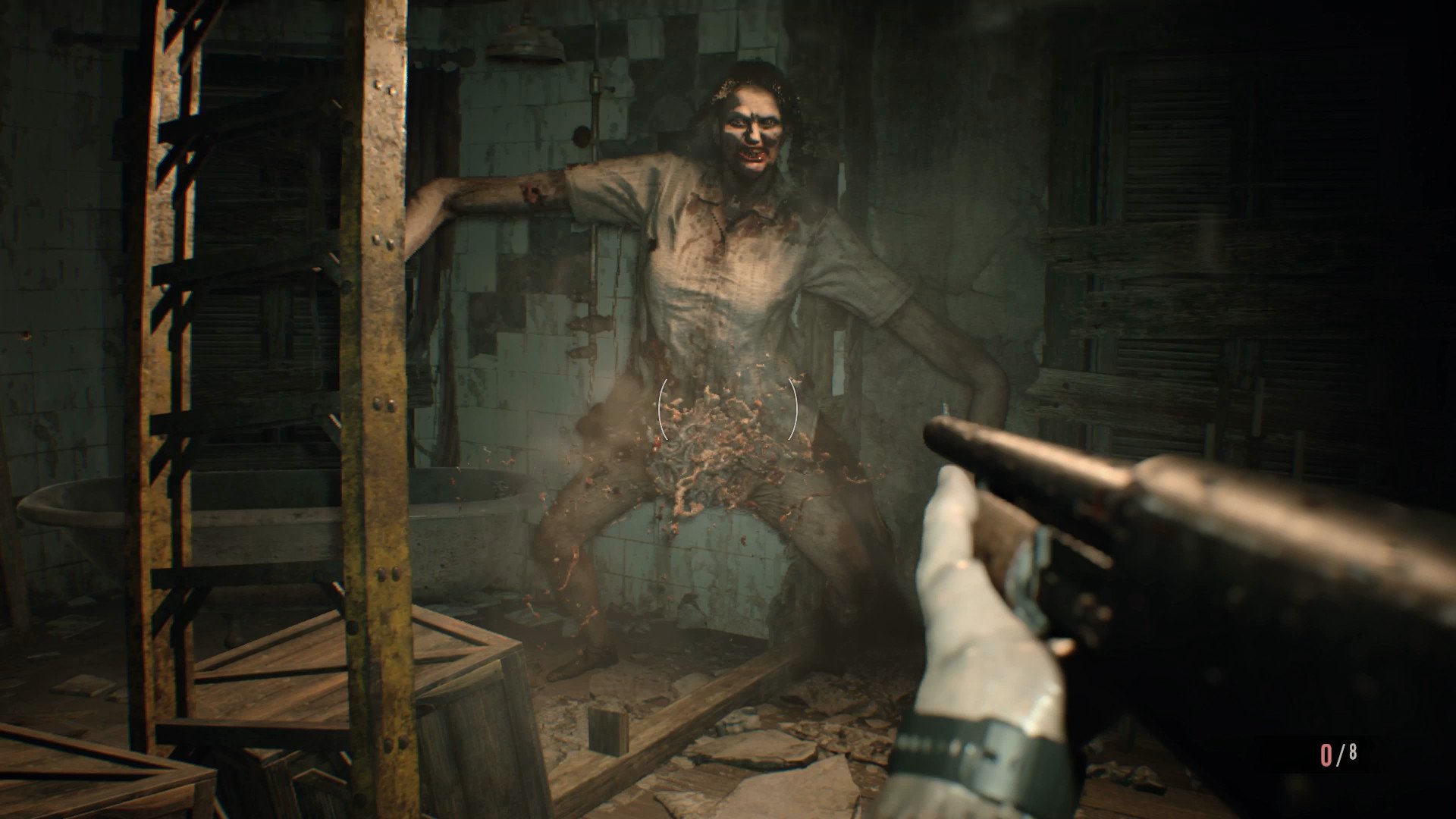
Right from the game's introduction, RE7 pulls no punches in making you feel vulnerable, going to lengths to demonstrate that Ethan isn't a trained police officer or military hero, he's just a regular dude, full of fear with every breath. The way Ethan wields weapons, frantic and terrified, really gives him a strong visual character despite the game's first-person view.
I'd go as far to call it the best first-person horror game I've played, and certainly the best horror game I've played on Xbox One.
RE7 lifts some of the classic game's restrictions, including resource-based save points. There are no ink ribbons in RE7.
You can save in any location that has a cassette recorder, complete with that classic save room "safety" music. You also have access to storage crates as seen in previous games, allowing you to stock up on scavenged items to free up space in your limited inventory. Since inventory management takes place in real time, having a full backpack can be really dangerous at the wrong moment.
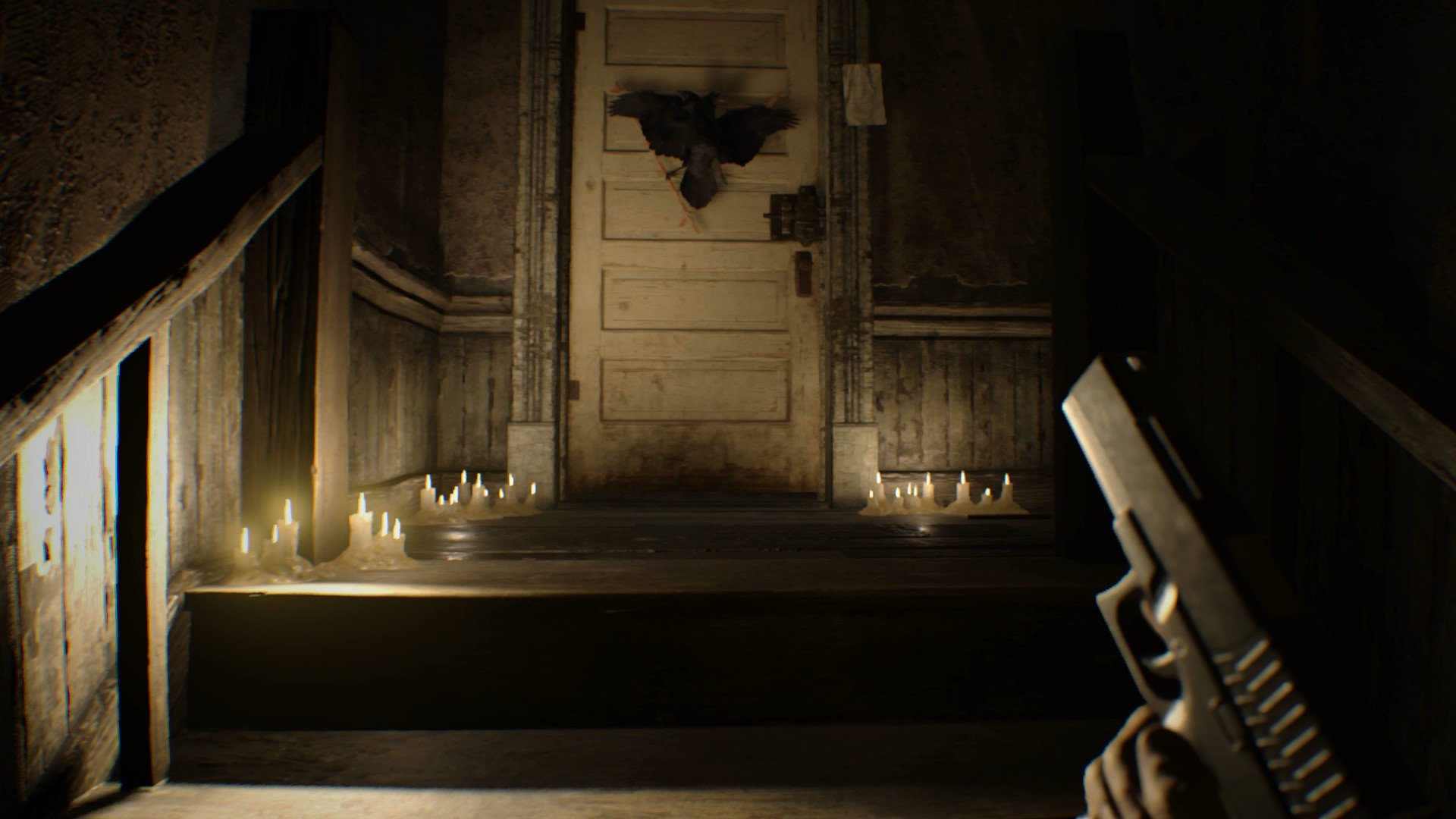
Not having to manage ink ribbons feels very convenient, giving you the freedom to save and leave the game whenever you feel like it. I think it's a little too generous, however, that the game also has auto-saving checkpoints, which tend to occur before difficult events, boss fights, and even when entering new areas. Some may disagree, but I think RE7 would've been fine without this mechanic, as it diminishes the sense of vulnerability and risk.
Overall, Resident Evil 7 is a true return to form for the franchise. I'd go as far to call it the best first-person horror game I've played, and certainly the best horror game I've played on Xbox One.
Resident Evil Redeemed
Conclusion
Resident Evil 5 and 6, while sort of fun, were massive disappointments for many fans of the classic games. Capcom has abandoned its assault on what makes Resident Evil Resident Evil, and have instead taken the franchise back to its grisly, survival horror roots.
Huh? ... Nope... nope. Nopenopenopenopenope. #ResidentEvil7 pic.twitter.com/r2ynlnYw5q— Jez (@JezCorden) 23 January 2017
Nope... nopenopenopenopenope.
I loved exploring the dilapidated swamps of the Baker Plantation, exploring each macabre room, perusing each foreboding text file, and desperately diving through each fetid trash can for discarded shotgun shells. The Baker family are brimming with depraved personality and beat out some of the franchise's most staple characters for their demented, violent behavior. Some of RE7's most horrific moments will be burned onto your mind and may take weeks to subside.
Pros:
- Revives the classic survival horror formula
- Visuals are detailed, atmospheric, and brutal
- Story drives you forward
- Combat is frantic and visceral
- Xbox Play Anywhere support
Cons:
- Auto-save feature limits the sense of vulnerability
- Some frame rate and texture quirks
If Resident Evil 7 is any indication, the planned Resident Evil 2 remake will remain as faithful to the series' most successful formula when it launches in the future. Hopefully, Capcom will relinquish its attempts to turn Resident Evil into a mass-market action title, as it simply doesn't work.
RE7's first person perspective retains the sense of fear while giving you a greater sense of control over combat that the older game's tank-control auto-aiming simply couldn't. I think we'll look back with fondness on RE7 as a turning point for the series. If you're a fan of the franchise, or of horror in general, Resident Evil 7 is a must-buy purchase.
Resident Evil 7: Biohazard launches on January 24th, 2017 for Xbox One and Windows 10, Steam, PS4, and PSVR.
- Buy Resident Evil 7: Biohazard on Xbox and Windows 10
- Buy Resident Evil 7: Deluxe Edition on Xbox and Windows 10

Jez Corden is the Executive Editor at Windows Central, focusing primarily on all things Xbox and gaming. Jez is known for breaking exclusive news and analysis as relates to the Microsoft ecosystem — while being powered by tea. Follow on X.com/JezCorden and tune in to the XB2 Podcast, all about, you guessed it, Xbox!
